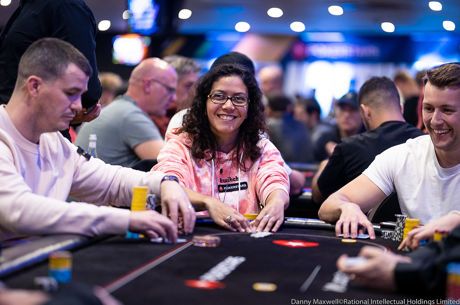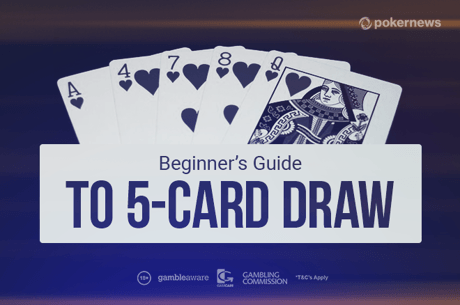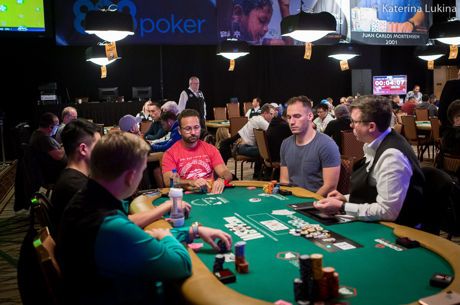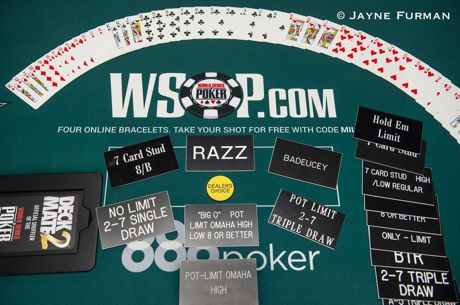Deuce-to-Seven Triple Draw Strategy with Matt Glantz

Whether you’re watching high-stakes poker action online or the big live mixed games, the challenging game of Deuce-to-Seven Triple Draw Lowball is usually one of the players’ favorites.
The game — also known as Kansas City Lowball or, simply, “Deuce” — has been around for a long time, but recently its action has been growing. We hit up Matt Glantz recently during the $10,000 Limit 2-7 Triple Draw Lowball Championship to talk about the game and some of its strategies.
Glantz has $5.8 million in career tournament earnings, more than 10% of which has come in tournaments that included 2-7 Triple Draw. The long-time pro is a mixed game specialist, with a final table in both the $50,000 H.O.R.S.E. back in 2008 and the $50,000 Players Championship in 2011, on top of final tables in $10,000 versions of both of those events.
With so many games to like and choose from, Glantz particularly enjoys 2-7 Triple Draw. While he reports the game is not typically spread in straight games on the east coast, you can find a game at the Commerce every now and then.
“Deuce is a very fun game, and I think that it’s growing,” said Glantz. “All the draw games are really fun to play, and it’s one of the crux games for the mix, together with Omaha eight-or-better and Stud eight-or-better — those are always in the mix.”
The problem with games like 2-7 Triple Draw is that casinos usually only offer them as part of a high-stakes mixed rotation, and for Americans in particular — many of whom cannot play real money “Deuce” online — it can be very hard to get started with this game.
“It would be great if casinos spread this game at a lower level,” Glantz said, “But it’s more about getting people to play it. I’m sure some poker rooms would love to offer those games, or they do offer them, but they just don’t get the customers for it.”
“It’s just a much different game than no-limit hold’em and it takes a lot of time for other people to get used to. The game is growing though, so hopefully at some point there will be games at all levels,” he added.
In 2-7 Triple Draw the goal is to make the best five-card low hand after a total of three drawing rounds. The best possible hand is 7x5x4x3x2x with at least two different suits, with flushes and straights both counting against you. For newcomers to this game, Glantz has some advice you should take to heart. While drawing cards looks very enticing, it’s a lot about being able to maintain patience.
“You have to play pretty snug at the beginning when you’re inexperienced at this game,” Glantz said. “You want to make sure you have a deuce and a seven in your hand and really try to draw to the nuts and sevens and eights only.”
In Triple Draw, hands are described by looking at the highest card first, followed by the second-highest. So when Glantz mentions “an eight” he is referring to a hand in which the eight is the highest card in your hand like 8x6x5x4x3x, a hand you could also announce at showdown as an “eighty-six” (noting the highest two cards).
“You don’t want to be drawing to a nine-low when you’re inexperienced, and it goes without saying that in every game, when you’re inexperienced, you want to take most of the risk and variance out of it and play really tight,” Glantz continued. “If you’re just learning the game, make sure to always start with a deuce and a seven, or three cards to an eight in your hand that don’t make a straight,” Glantz said.
Having a hand that has the possibility to make a straight is very dangerous, and Glantz emphasizes to avoid that at all costs.
“The biggest mistake inexperienced players make is playing hands that could make a straight, four cards to a seven like a 3x4x6x7x or a 4x5x6x8x. You’ll learn from experience that those are just junk hands that you can’t go with.”
While you might be tempted to draw one time for a good price with those hands that could make straight, you could potentially get yourself in a lot of trouble. However another option that is possible when you get dealt those kinds of hands is “snowing” — that is, standing pat and not drawing any extra cards, and turning your hand into a bluff. Bluffing in limit games might seem impossible if you’re inexperienced, but there are definitely spots for it.
“If you’re in a spot where your hand is really bad, like a straight draw when you’re in the pot for free or when you’re forced to play it — where you don’t have many outs to improve your hand without making a straight — then that might be a good spot to snow because you just don’t have that much equity by drawing,” Glantz said.
Diving deeper into “Deuce” strategy, Glantz offered a good explanation of why position is very important in this game as well.

“Position is as important in Triple Draw as it is in any game, because you get more information when you see how many cards your opponent is drawing in front of you,” Glantz said. “Your opponents’ actions will really change the decisions that you will make, and need to make.”
We asked Glantz for his take on what to do when you start with a good draw, but when you don’t improve on the first draw.
“The smoother the hand is, like a 7x5x2x, you’ll almost never fold on the first draw if you miss. If it’s two bets to you, you’re going to need a four-card eight or four-card seven to continue, and you’re looking to have smooth draws that aren’t straight draws, and don’t include an 8x7x6x. With other hands you can then continue to draw.”
Lastly we gave Glantz a scenario in which you’re heading into the final round of betting after you and your opponent have both taken one card on the last draw. His response was not a straightforward “here's what to do,” but instead offered a very interesting take on how 2-7 Triple Draw is a lot like chess.
“Usually there aren’t that many options in Triple Draw on the river. You’re check-calling, check-raising, or leading out as a bluff or for value,” Glantz explained.
“You just want to go over all options and think of the consequences of each action based on your opponent’s ability. If you check, your opponent can only check or bet. If you bet, your opponent can call, fold or raise. So it’s a chess match with what’s going to happen based on your action.”
Thanks to Matt Glantz for taking the time to help us improve our “Deuce” games. For those who enjoy 2-7 Triple Draw, there is a $1,500 event at the WSOP on June 15th at 4:00 p.m. (Event #33).
Want to stay atop all the latest in the poker world? If so, make sure to get PokerNews updates on your social media outlets. Follow us on Twitter and find us on both Facebook and Google+!









